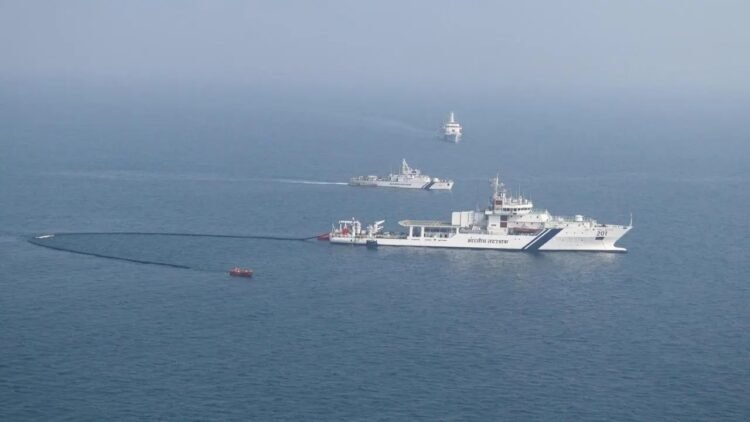The large-scale pollution response exercise witnessed participation from 32 countries and reaffirmed India’s commitment to marine environmental protection.
NEW DELHI (India CSR): In a major demonstration of India’s maritime preparedness and environmental stewardship, the Indian Coast Guard (ICG) successfully conducted the 10th National Pollution Response Exercise (NATPOLREX-X) along with the 27th National Oil Spill Disaster Contingency Plan (NOSDCP) and Preparedness Meeting off the coast of Chennai, Tamil Nadu, on October 5–6, 2025.
The biennial flagship event saw participation from 40 foreign observers representing 32 countries and over 105 national delegates, making it one of the largest coordinated marine pollution response drills in Asia. The exercise underscored India’s readiness to handle oil spill disasters and its commitment to protecting the marine environment in line with global standards.
Strengthening India’s Oil Spill Response Framework
Organized under the leadership of Director General Paramesh Sivamani, Chairperson of NOSDCP, NATPOLREX-X tested India’s national preparedness to tackle large-scale oil spills through multi-agency coordination and rapid deployment of assets.
The Indian Coast Guard deployed a wide range of resources including Pollution Control Vessels (PCVs), Offshore Patrol Vessels (OPVs), Fast Patrol Vessels (FPVs), and aerial assets like Chetak helicopters and Dornier aircraft. These assets simulated real-time containment, recovery, and dispersal operations during the exercise.
The drills validated India’s operational readiness, with special focus on joint coordination between central ministries, state governments, port authorities, and oil handling agencies — essential elements of the National Oil Spill Disaster Contingency Plan (NOSDCP) framework approved in 1993.
First-Ever Shoreline Cleanup Drill at Marina Beach
A major highlight of this year’s exercise was the first-ever shoreline cleanup drill conducted at Chennai’s iconic Marina Beach. The simulated operation involved a joint effort by the Greater Chennai Corporation, Tamil Nadu Pollution Control Board, State Disaster Management Authority, and local law enforcement agencies.
The initiative demonstrated the synergy between national and local authorities in restoring affected coastal zones after an oil spill. It also reflected the importance of public participation and state-level coordination in environmental disaster management.
Knowledge Sharing and Technical Insights
The technical sessions of NATPOLREX-X provided a valuable forum for discussion on emerging environmental challenges. Experts presented case studies on Nurdle spills, hazardous and noxious substances (HNS), post-spill monitoring and environmental assessments, and shoreline cleanup experiences following the MV MSC ELSA 3 incident.
These sessions fostered collaboration between scientists, policy makers, and operational agencies, paving the way for more advanced strategies in oil spill response, pollution mitigation, and post-incident recovery.
Showcasing India’s Maritime Self-Reliance
Reflecting the vision of Prime Minister Narendra Modi’s “Aatmanirbhar Bharat” and “Make in India” initiatives, the exercise also showcased the use of indigenously built pollution control and surveillance equipment. Several participating stakeholders, including major ports and oil handling companies, deployed homegrown assets, underscoring India’s growing capability in maritime technology and environmental protection infrastructure.
The demonstrations highlighted India’s progress toward achieving self-reliance in marine safety and pollution control while promoting environmentally responsible industrial practices.
Commitment to Marine Environmental Protection
Since being designated as the Central Coordinating Authority for oil spill response in 1986, the ICG has continuously expanded its pollution response capabilities. The organization currently operates four Pollution Response Centres located in Mumbai, Chennai, Port Blair, and Vadinar, ensuring nationwide readiness for maritime environmental emergencies.
Given that over 75% of India’s energy imports are transported via sea routes, maintaining robust oil spill contingency systems is vital. NATPOLREX-X not only strengthened domestic capabilities but also enhanced international cooperation and trust in maritime safety.
You Learn
The successful completion of NATPOLREX-X marks another milestone in India’s proactive approach to safeguarding marine ecosystems and enhancing disaster resilience. By integrating technology, training, and inter-agency collaboration, the Indian Coast Guard continues to set new benchmarks in pollution response readiness.
Through this exercise, India reaffirmed its unwavering commitment to clean seas, safe coasts, and sustainable maritime development, setting an example for regional and global partners in marine environmental protection.







